 Petzlover
Petzlover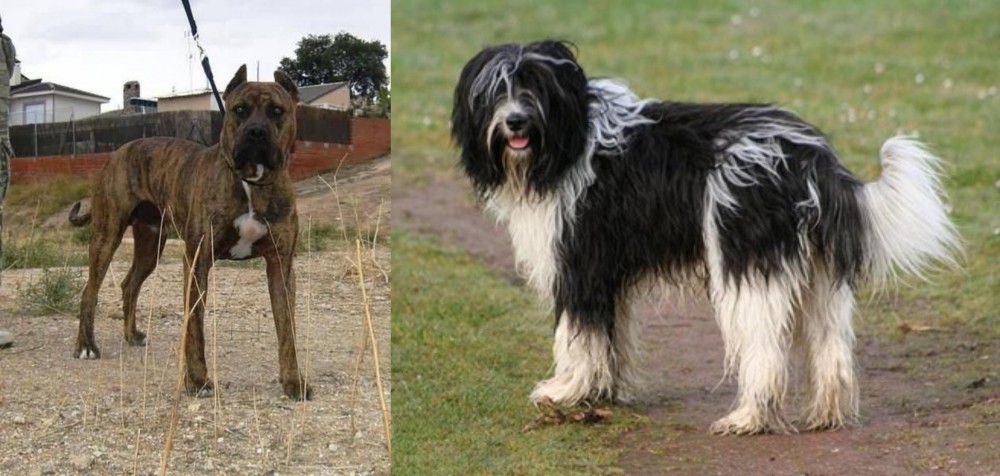 Perro de Toro is originated from Spain but Schapendoes is originated from Netherlands. Perro de Toro may grow 14 cm / 6 inches higher than Schapendoes. Perro de Toro may weigh 15 kg / 34 pounds more than Schapendoes. Both Perro de Toro and Schapendoes has almost same life span. Both Perro de Toro and Schapendoes has almost same litter size. Perro de Toro requires Low Maintenance. But Schapendoes requires Moderate Maintenance
Perro de Toro is originated from Spain but Schapendoes is originated from Netherlands. Perro de Toro may grow 14 cm / 6 inches higher than Schapendoes. Perro de Toro may weigh 15 kg / 34 pounds more than Schapendoes. Both Perro de Toro and Schapendoes has almost same life span. Both Perro de Toro and Schapendoes has almost same litter size. Perro de Toro requires Low Maintenance. But Schapendoes requires Moderate Maintenance
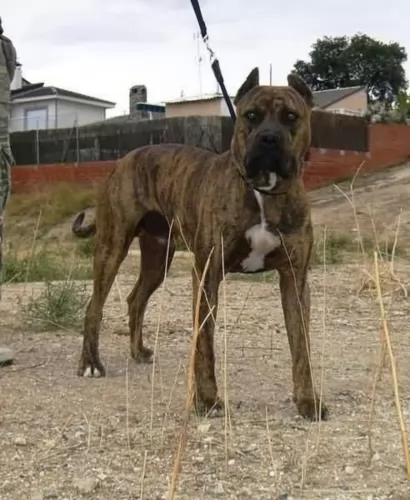 The rare Spanish Perro de Toro seems to have unclear origins, with some saying the dog is a direct descendant of the Toulouse Mastiff, while others say that the dog was developed by crossing the Alano with the Dogue de Bordeaux.
The rare Spanish Perro de Toro seems to have unclear origins, with some saying the dog is a direct descendant of the Toulouse Mastiff, while others say that the dog was developed by crossing the Alano with the Dogue de Bordeaux.
The dog hails from Spain and was once used as a fighting kind of dog but today it is essentially a family pet. The dog is an ancient breed, an ancestor of many of the molosser breeds that are around today.
 Known also as the Dutch Sheepdog, the Schapendoes originates in the Netherlands.
Known also as the Dutch Sheepdog, the Schapendoes originates in the Netherlands.
It has always been known as a herding dog and farm dog. There were times during the 1940s when the dog’s numbers dropped considerably, but fortunately a breed club known as the Nederlandse Schapendoes was formed in 1947.
It wasn’t until 1971 that the dog earned recognition as a Dutch breed and the Federation Cynologique Internationale recognized this Dutch Sheepdog in 1989.
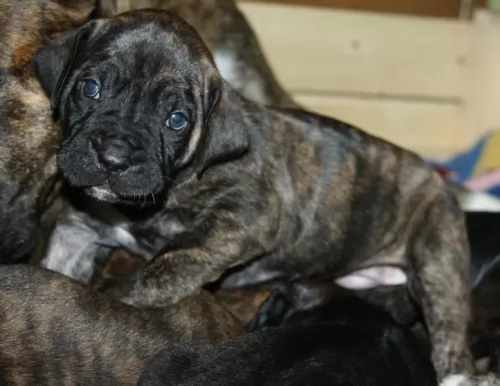 This is a strong, powerful, large breed of dog, making a good watchdog and guardian. He can be anything from 56 to 64cm in height and weigh between 34 and 40kg.
This is a strong, powerful, large breed of dog, making a good watchdog and guardian. He can be anything from 56 to 64cm in height and weigh between 34 and 40kg.
The nose of the dog is broad and black, the ears are set high and droop over slightly,making them floppy ears, but they have always been cropped to stand up erect.
He's a sturdy dog and the tail is fairly thick at the base, tapering to a point. These days it tends to be undocked and left long. The neck is strong and powerful too and the head brachycephalic. The short coat includes colors such as yellow, grey, fawn and red with the black mask.
The Spanish Bulldog looks fairly intimidating and he will certainly need training and socialization if he is to be obedient and well behaved.
He isn’t aggressive but is confident, dominant, fearless, loyal and also loving towards his owner. He is devoted towards his human family and is good with children. Like any mastiff type breed, he will need a firm, kind, consistent, patient owner. This is the kind of owner who will understand this breed type and take time out with him to exercise him and provide him with mental and physical stimulation so as to prevent boredom.
 The Schapendoes is a medium sized herding dog standing at between 40 and 50cm in height and weighing between 12 and 25kg.
The Schapendoes is a medium sized herding dog standing at between 40 and 50cm in height and weighing between 12 and 25kg.
When you look at him, you’re reminded of the Old English Sheepdog or the Bearded Collie. The thick, double coat of the dog can be a mix of colors and can be brown and white, black and white and gray and a mix of all these colors.
In spite of the thick coat, the dog sheds very little. He is an active dog and is known to be able to jump high. This makes him perfect for ball and frisbee games as he will leap into the air to try and catch the ball.
He has medium length floppy ears and the tail is long and feathered, carried high when busy, but when he is relaxed the tail hangs low.
Brave, cheerful,social and loyal, the Schapendoes is a shaggy Dutch dog who makes a splendid pet and companion for active people.
He is intelligent too, and in fact it is why he makes such a great farm dog too as he is able to work on his own and co-operates with his owner. He just loves being active, and will happily join you on all your hikes, runs on the beach, swimming, walks and other activities.
He thrives on being counted in as one of the active family members. This intelligence of his makes him easy to train and socialize, making him well mannered and obedient.
His amicable nature allows him to get on with all well disciplined children as well as with other pets in the home.
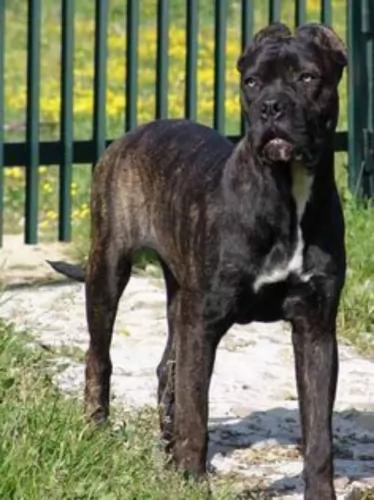 Contrary to what many people think, the temperament of the Perro de Toro is calm and well balanced. This is a reliable, loving, loyal dog who wants to protect his human family.
Contrary to what many people think, the temperament of the Perro de Toro is calm and well balanced. This is a reliable, loving, loyal dog who wants to protect his human family.
He gets on well with children and with pets in the home and when trained and socialized, this intelligent dog is well mannered, obedient and sometimes even submissive.
True, the Perro de Toro has a history of being involved in all kinds of things, from hunting to fighting and also being a working dog, but he is now waiting to show you what a splendid pet he can be if he is raised by the right kind of people.
 Because this dog has always been a working dog, he has learned to be independent.
Because this dog has always been a working dog, he has learned to be independent.
They’re eager to please their owners and easy to train too. They’re not aggressive and are friendly and affectionate and want to protect their owners.
They’re cheerful and playful and are tolerant of children and pets in the home. However, they don’t want little children being allowed to climb over them.
You can expect these big cuddly dogs to make loyal, devoted pets when treated with love, care, kindness and respect.
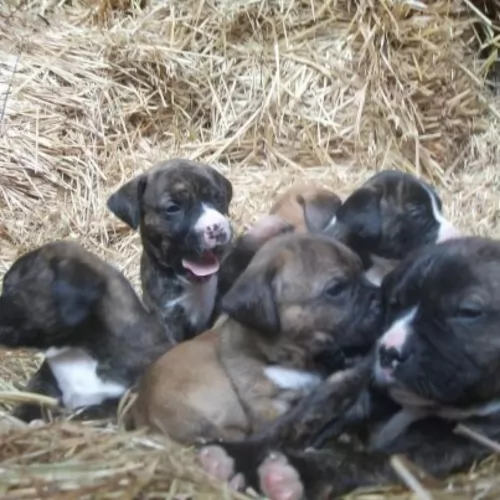 This is a dog breed that is fit and healthy, but to keep him that way you want to make sure he has enough exercise, love and nutritious food.
This is a dog breed that is fit and healthy, but to keep him that way you want to make sure he has enough exercise, love and nutritious food.
He is not known to suffer from any particular disease, but even so, it is wise to be aware of some of the common dog illnesses that your dog could pick up so you can get veterinary help for him just as soon as possible.
With cancer, cells grow rapidly and invade tissue. Dogs can get any of the many cancers there are. Both hereditary and environmental factors can contribute to the development of cancer in canines. Cancer can show up as lumps, swelling, sores that won’t heal, weight loss and difficulty with breathing.
Heartworms are transmitted from one animal to the next by mosquitoes. These worms live in the heart and pulmonary arteries of an infected animal, travelling through the bloodstream and causing havoc. Heartworm is dangerous and can actually be life threatening. Symptoms include coughing, vomiting, battling to breathe and weight loss.
This is a viral disease that can strike terror in anybody who has seen an animal with rabies. It affects the brain and spinal cord of your dog. It is preventable through means of a vaccine. Once symptoms appear, it is a disease which is nearly always fatal.
 Your Schapendoes is a generally healthy breed and with good food, a good amount of exercise and plenty of love and care, he can reach the ripe age of 15 or so.
Your Schapendoes is a generally healthy breed and with good food, a good amount of exercise and plenty of love and care, he can reach the ripe age of 15 or so.
Every dog however, has the potential to get one of the many canine diseases there are. Some of these canine diseases to look out for include hip dysplasia, dental problems, eye diseases, bloat, cancer and others.
Some people think that problems with teeth are mild – nothing to worry about and yet bad teeth can affect the quality of life for your pet.
Problems with the pet’s teeth usually start with a build- up of plaque that leads to tartar. This can lead to gingivitis and then periodontal disease can develop. Dogs can have bad teeth and this can affect organs in the body.
Problems with the teeth can be serious and your veterinarian will need to do an oral checkup and dental cleaning. If your dog has oral problems, you may notice bad breath, loose teeth, dribbling, tartar on the teeth and pawing at the mouth.
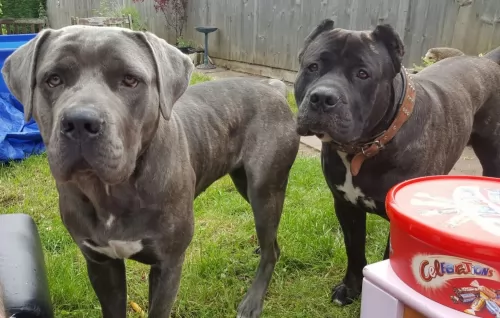 If they are not being used as working dogs, they are family pets, and you need to give them a lot of daily exercise. You will need to give him some walks or hikes and allow him a good run in the country.
If they are not being used as working dogs, they are family pets, and you need to give them a lot of daily exercise. You will need to give him some walks or hikes and allow him a good run in the country.
The Perro de Toro is a short haired dog, and as a moderate shedder, he isn’t going to require too much grooming. A brushing twice a week will help get rid of his hair.
When brushing him, turn it into a bit of a grooming session and check inside his ears, look at his eyes and try to look inside his mouth. He can’t tell you if he has terrible toothache from a rotting tooth and he will rely on you to check his teeth.
Mastiff type dogs need a wholesome diet to remain strong and active. If you are going to feed your pet one of the commercially manufactured dog foods, make sure it is one of the top quality ones.
Avoid the ones that use lots of colorants, preservatives and unhealthy fillers as these can make your dog sick. Try and give him some home-made food which can be added into his dry kibble occasionally.
Boiled chicken, brown rice or pasta and some vegetables such as carrots, sweet potato and spinach chopped up will be excellent for him and will ensure he doesn’t battle with digestive upsets. If you can, every now and then try to include some raw meat for the benefit and health of your pet. Never leave him without a bowl of fresh, cool water.
 The Schapendoes has a dense double coat which can become quite long in places. The hair is slightly waved and there is quite a lot of hair around the face which includes a mustache and beard.
The Schapendoes has a dense double coat which can become quite long in places. The hair is slightly waved and there is quite a lot of hair around the face which includes a mustache and beard.
He will need to have his hair brushed twice a week, and some people choose to have him professionally clipped.
Trim his nails, check inside the ears for ear infection, check that the eyes are nice and clear without discharge, check inside the mouth for rotten teeth and check him over for any unusual lumps.
Your Schapendoes is an active dog and you want to ensure that the food you buy him keeps him active and healthy.
It is important to choose the best dog food if you buy commercially manufactured dog food. Then you can be sure it will have the right formulation of vitamins and minerals.
Home-made food is also an excellent choice for your pet. Boiled chicken, brown rice or pasta and spinach, sweet potatoes and carrots can be very healthy and tasty. Keep it simple like this. Chop it all up and add it into the dry kibble a couple of times a week to give him a nutritious treat.
Some raw meat added in occasionally will do him the world of good and keep the skin and coat healthy. Never leave your pet without a constant source of fresh, cool water.